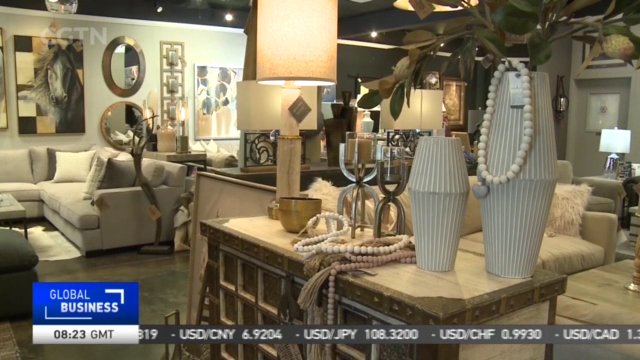
17:24, 13-Jun-2019
US-China Trade Tensions: Tariffs force US furniture retailers to increase prices
Updated
17:31, 09-Jul-2019

When the Trump administration hiked up tariffs on Chinese imports again last month, many American businesses took the hit. 10 percent levies on 200 billion dollars' worth of Chinese products shot up to 25-percent. CGTN's Mark Niu reports - furniture retailers are among those now making adjustments.
In the California Central Valley city of Modesto, it's business as usual for The Furniture Market.
As customers look for the best fit, it's also not hard to notice something else on display - fresh signs indicating a new price hike and the reason why.
FRANCIS O'BRIEN, OWNER THE FURNITURE MARKET "The importer pays the duty and the tariff. He passes his increased costs on to me. And then I pass them on to the consumer. And the consumer, if I just put it into the price of the product, they wouldn't know they are paying the tariff. Because our president and his staff are telling the customers or United States citizens that tariffs don't affect them. China's paying them. And China isn't paying. They are paying them."
FERNANDO GUEVAS CUSTOMER "He's an honest man too. He's telling you this is the reason why it's going up. But we're in need of a couch, probably going to get it today instead of a week from now when it goes up a little further."
Because it's so difficult to know how every part of the thousands of furniture pieces have been impacted, O'Brien has averaged it out to a 3.75 percent increase on all items sold.
MARK NIU MODESTO, CALIFORNIA "And here at Furniture Market, there's no hiding the numbers. This is a customer's recent sales order. Clearly, in a line item, it says tariff 3.75%, adding $73.46 to this bill."
At the family's other store, At Home, O'Brien's wife, Pamela, is taking a different approach.
"Every day I'm opening a letter. And it's like another price increase, another price increase."
With furniture and hundreds of accessories, At Home is attempting to avoid the politics of the situation by striking a balance in the amount prices are raised.
PAMELA O'BRIEN, OWNER AT HOME "Even though it's a 25% increase, we're not going to charge that all to you. We are going to absorb some of it. You're going to take some, we're going to take some. So we are kind of doing the same thing with the customer, but in a sense it's a tax. It's a tax."
Pamela O'Brien estimates that at least 90-percent of her items have been impacted, even ones that say "Made in America."
PAMELA O'BRIEN, OWNER AT HOME "I called up the manufacturer and I'm like, 'well why do we have a price increase' and then he explained 'well, it's built here in the United States. But I get parts from all over the world. But when you look at the down, the down is made in China."
Francis O'Brien says many furniture manufacturers have moved operations out of China to places like Vietnam and Cambodia to avoid costs.
He believes that will hurt China. But he's also concerned about long-term damage to US business.
FRANCIS O'BRIEN, OWNER THE FURNITURE MARKET "China, once their economy grows and their standard of living increases, they are going to be a huge market for us. And we're going to want to be able to sell into that market. If we burn our bridges now, I don't know what's going to happen thirty or forty years from now."
O'Brien doesn't believe he's lost any purchases so far by highlighting the cost of the tariffs.
But he just wants the customer to know that in a trade war there's a price to pay, and much of that comes right out of their own pocket.
Mark Niu, CGTN, Modesto, California.
SITEMAP
Copyright © 2018 CGTN. Beijing ICP prepared NO.16065310-3
Copyright © 2018 CGTN. Beijing ICP prepared NO.16065310-3